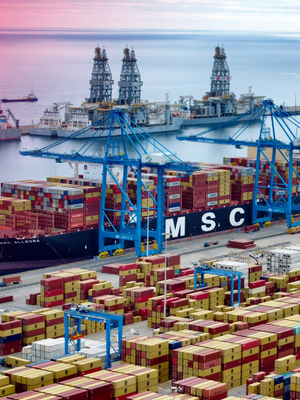OPCSA terminal selects Boldyn Networks and Nokia to bring cutting-edge private 5G to the terminal
30 September 2025 | Las Palmas de Gran Canaria, Spain
Boldyn Networks (Boldyn), one of the world’s largest neutral host and leading private network providers, has been awarded a strategic project by OPCSA (Operaciones Portuarias Canarias SA) to design, deploy, and operate a private 5G network utilising Nokia Digital Automation Cloud (DAC) at the Canary Islands’ largest container terminal. This network marks a significant milestone in the port terminal’s digital transformation journey, enhancing connectivity, operational intelligence, and reducing costs.
The initiative is aimed at testing technology and validating use cases such as:
- Connected worker equipping operators with tablets for container logistics and maintenance tasks.
- Digitalising RTG cranes (where onboard PCs are located 20 metres high) and monitoring of STS container cranes located at more than 100 meters (saving civil works and fibre optic connections).
Located in the port of Las Palmas, OPCSA is directly connected to more than 74 ports worldwide and sits on key shipping routes between Europe, Africa, and South America. OPCSA is part of TiL, a global leader in terminal operations. As a strategic logistics hub, the terminal handles high volumes of cargo and requires cutting-edge infrastructure to maintain efficiency and competitiveness.
The private 5G coverage deployed across OPCSA’s terminal is set to deliver key advantages, including:
- Reducing costs associated with inefficiencies in the maintenance and monitoring of refrigerated containers by ensuring reliable connectivity for operators during daily tasks.
- Enabling secure, real-time data transmission from RTG cranes over a Nokia Industrial fieldrouter, marking the first step towards remote crane operation.
- Facilitating real-time monitoring of large volumes of telemetry data from STS cranes, helping to minimise unexpected downtime and avoid operational disruptions.
Leveraging best-in-class, high-capacity Nokia technology, the solution delivers a secure and resilient network infrastructure that unlocks innovative capabilities and new levels of operational efficiency across the port.
The agreement utilises Boldyn’s Private 5G as a Service, offering OPCSA a fast, secure, and scalable network without the burden of managing infrastructure. This fully managed model ensures predictable costs, rapid deployment, and ongoing support. As the project progresses, Boldyn and OPCSA will assess performance and explore a broader rollout, positioning the port as a leader in digital logistics innovation.
Jan Nowak, CEO of OPCSA, said: “This partnership with Boldyn Networks represents a transformative leap for our terminal. The deployment of private 5G will not only streamline operations but also position OPCSA as a leader in port innovation across the region. As the project evolves, OPCSA is well placed to become a digitalisation leader within TiL by pioneering private 5G to drive innovation and efficiency across terminal operations.”
Mikko Uusitalo, CEO, Europe at Boldyn Networks, said: “We have substantial experience in enhancing port environments with reliable connectivity solutions tailored to the demands of high-volume logistics, real-time data exchange, and complex operational workflows. This expertise makes us exceptionally well-equipped to deliver a transformative private 5G network for OPCSA. We're excited to bring our capabilities to such a strategically important terminal and support its journey towards becoming a fully digitalised, smart port.”
Michael Aspinall, Head of Enterprise Campus Edge Sales Europe at Nokia, said: “Ports are becoming increasingly digital, connected, and automated, and reliable private wireless is the foundation that makes this transformation possible. We are proud that OPCSA and Boldyn Networks have chosen Nokia’s industry-leading private 5G technology to enable new levels of efficiency, safety, and innovation at the Port of Las Palmas. This project showcases how Nokia Private Wireless connectivity empowers mission-critical operations and lays the groundwork for smarter, more sustainable logistics hubs worldwide.”

